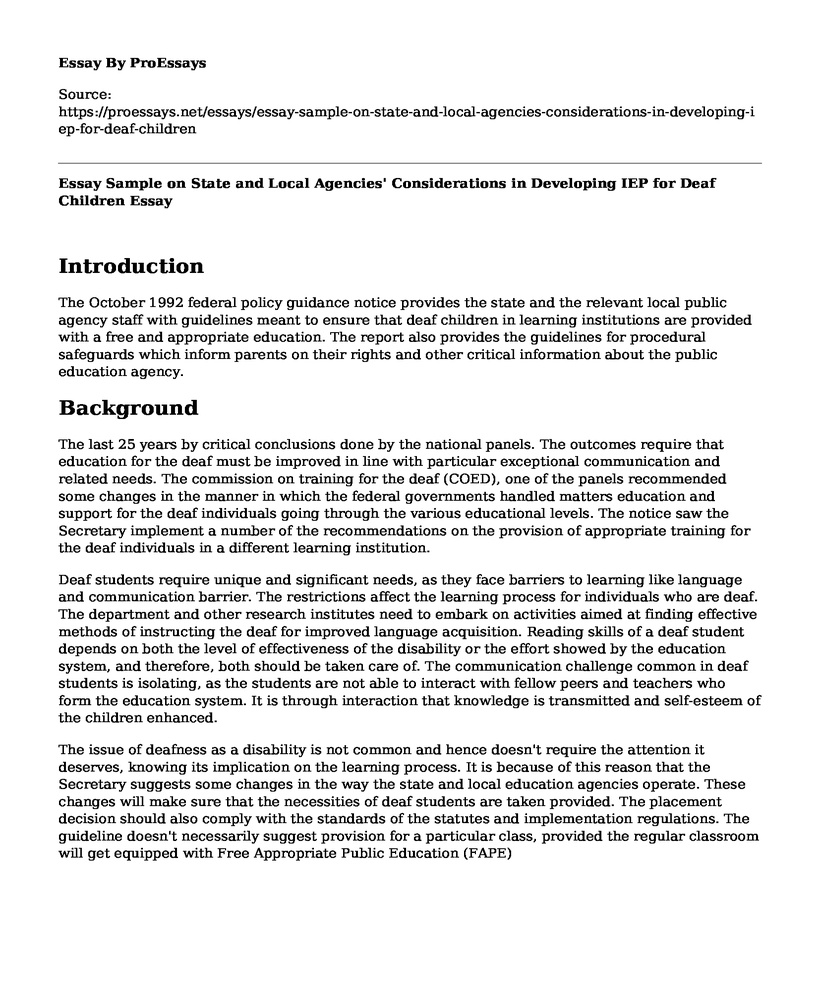Introduction
The October 1992 federal policy guidance notice provides the state and the relevant local public agency staff with guidelines meant to ensure that deaf children in learning institutions are provided with a free and appropriate education. The report also provides the guidelines for procedural safeguards which inform parents on their rights and other critical information about the public education agency.
Background
The last 25 years by critical conclusions done by the national panels. The outcomes require that education for the deaf must be improved in line with particular exceptional communication and related needs. The commission on training for the deaf (COED), one of the panels recommended some changes in the manner in which the federal governments handled matters education and support for the deaf individuals going through the various educational levels. The notice saw the Secretary implement a number of the recommendations on the provision of appropriate training for the deaf individuals in a different learning institution.
Deaf students require unique and significant needs, as they face barriers to learning like language and communication barrier. The restrictions affect the learning process for individuals who are deaf. The department and other research institutes need to embark on activities aimed at finding effective methods of instructing the deaf for improved language acquisition. Reading skills of a deaf student depends on both the level of effectiveness of the disability or the effort showed by the education system, and therefore, both should be taken care of. The communication challenge common in deaf students is isolating, as the students are not able to interact with fellow peers and teachers who form the education system. It is through interaction that knowledge is transmitted and self-esteem of the children enhanced.
The issue of deafness as a disability is not common and hence doesn't require the attention it deserves, knowing its implication on the learning process. It is because of this reason that the Secretary suggests some changes in the way the state and local education agencies operate. These changes will make sure that the necessities of deaf students are taken provided. The placement decision should also comply with the standards of the statutes and implementation regulations. The guideline doesn't necessarily suggest provision for a particular class, provided the regular classroom will get equipped with Free Appropriate Public Education (FAPE)
Free Appropriate Public Education
To develop an individualized education program (IEP) for the deaf under the individuals with disabilities education Act (IDEA), local education agencies (LEAs) and the States must comply with the regulations in section 504. One of the primary management is the evaluation and placement requirements of 34 CFR 104.35, under section 504 regulation. These recommendations are comparable to those in the IDEA. COED believes that the development of the IEP for the deaf requires both the state and the LEAs to meet several considerations. Firstly, LEAs should consider the communication needs of both the children and their families by applying the modes of communication they prefer. The state through the LEAs should also consider the linguistic needs of the children with the disability. It is also essential to factor in the frequency of hearing loss and exploring the possibility for application of residual hearing. The academic level is another factor that is critical in developing IEP hence recommended. Lastly, the state and the LEAs must consider social, cultural and emotional requirements for the deaf students that can help them build their interacting ability. Deaf students require special considerations, especially in the curriculum content and the method of delivery. IDEA provides regulations under the Least Restrictive Environment (LRE) requires public agencies to avoid segregation of the deaf students from the children without disabilities, unless the nature of the disability forces so.
Procedural Safeguards
Section 504 regulations require the public agency to be compliant to part B procedural safeguards. The fundamental aim of the procedural safeguards is to ensure parents are familiar with their rights and critical federal agency decisions. Part B requires that in the event of a child placement into special education, parents must be informed in advance. This should be in a written notice, and parents must sign consent before the admission after receiving details of the placement decision.
Also, part B regulations require the public agency to inform the parents in time in case they have intended changes in identification, evaluation and placement. The notice should give parents details on the proposed action, and the reason for the move. In case of a rejected work, the public agency must inform the parents giving details of other options that under consideration. This information is critical to parents in their role of helping deaf students acquire education.
There is a need to improve the status of both public and private education. With the regulations recommended by the COED, children living with disabilities will be assured of free appropriate education. Least restrictive environment for the children with the disability will encourage their interaction with their peers and teachers, helping them develop linguistic skills. Parent's knowledge of essential details of the education status of their children will help them overcome obstacles that lie their way in pursuit of education.
References
Deaf Students Education Services; Policy Guidance, U.S. Department of Education. (2018, September 26). Retrieved from <https://www2.ed.gov/about/offices/list/ocr/docs/hq9806.html>
Cite this page
Essay Sample on State and Local Agencies' Considerations in Developing IEP for Deaf Children. (2023, Jan 16). Retrieved from https://proessays.net/essays/essay-sample-on-state-and-local-agencies-considerations-in-developing-iep-for-deaf-children
If you are the original author of this essay and no longer wish to have it published on the ProEssays website, please click below to request its removal:
- Education Is My Life
- Effective Learning of the Severely Disabled Students
- The Priory Hospital: Marketing Analysis
- Essay on Nursing: Lifelong Learning
- Series of Events that Occurred During SARS II Paper Example
- Heartland Hospital Patient-Centered Initiative Evaluation
- Essay Sample on Unequal Healthcare Delivery: A Health Equity Policy for the US







